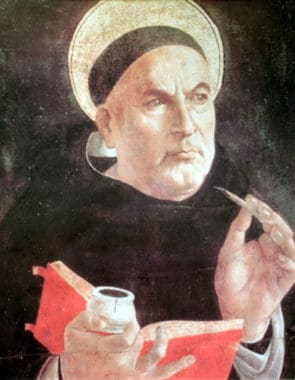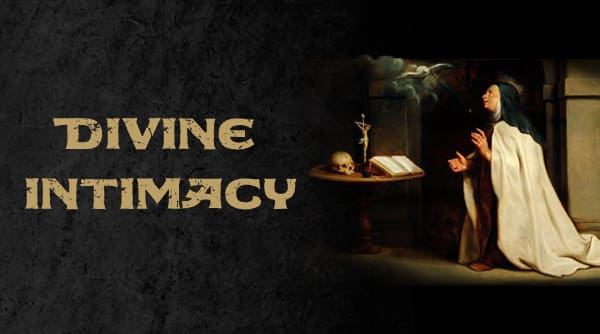Voluntary Poverty
Presence of God – O Lord, deign to show me the treasures concealed in voluntary poverty and the duties which proceed from it.
MEDITATION
 St. Thomas teaches that in order to arrive at the perfection of charity it is necessary for the heart to be completely detached from the things of the world, that it may concentrate all its affections on God. “He who possesses temporal goods, by the very fact that he possesses them, is inclined to love them. Consequently, the fundamental basis for the acquisition of perfect charity is voluntary poverty, that is, the free renunciation of all one’s possessions, as the Master said in St. Matthew: ‘If thou wilt be perfect, go sell what thou hast, and give it to the poor, and come, follow Me!’” (Summa Theologica IIa IIae, q.186, a.3).
St. Thomas teaches that in order to arrive at the perfection of charity it is necessary for the heart to be completely detached from the things of the world, that it may concentrate all its affections on God. “He who possesses temporal goods, by the very fact that he possesses them, is inclined to love them. Consequently, the fundamental basis for the acquisition of perfect charity is voluntary poverty, that is, the free renunciation of all one’s possessions, as the Master said in St. Matthew: ‘If thou wilt be perfect, go sell what thou hast, and give it to the poor, and come, follow Me!’” (Summa Theologica IIa IIae, q.186, a.3).
This is particularly realized in the religious life by the vow of poverty. However, even those who are living a life of consecration to God in the world may embrace voluntary poverty as a means of tending to perfection. The Church makes it a matter of obligation for all who belong to Secular Institutes precisely because the state of perfection requires a serious obligation of poverty. The members of these Institutes “must make a vow or a promise of poverty, by which they relinquish the free use of their material goods” (Apostolic Constitution Provida Mater Ecclesia). The essence of voluntary poverty consists in this renunciation of the free and independent use of temporal goods. In fact, only one who renounces the free use of temporal goods can, according to St. Thomas, “live without possessing anything of his own.” By making the vow of poverty, man attains the freedom necessary to follow Jesus in the way of perfection.
COLLOQUY
O Lord, what great treasures are contained in holy poverty. “Poverty is a good which contains within itself all the good things in the world. It is a great domain—I mean that he who cares nothing for the good things of the world has dominion over them all. What do kings and lords matter to me if I have no desire to possess their money or to please them, especially if by so doing, I should cause the least displeasure to You, my God? And what do their honors mean to me if I have realized that the chief honor of a poor man consists in his being truly poor? True poverty, which is embraced for love of You, O Lord, brings with it a great dignity; it impresses everyone because its only care is to be pleasing to You” (Teresa of Jesus Way of Perfection 2).
I praise You, O Lord, because You have given me the grace to embrace holy poverty, which frees me from all preoccupation with material things and delivers me from earthly slavery! Thus I, miserable creature that I am, have the great honor of serving You alone, the King of heaven and earth.
O Lord, grant me the favor of preserving the sweet bonds of holy poverty which draw me away from the world to bind me to You. Grant that, in conformity with the obligations undertaken by my profession, poverty may really be “the arms inscribed on my banner; grant that I may observe it in all things and everywhere: in my dwelling, my dress, my words, and much more in my thoughts” (Teresa of Jesus Way of Perfection 2). Yes, even in my thoughts, so that my desires will not, if only for a single moment, bring me back to the things I have given up for love of You.
I understand and confess, O my God, that every time I have complained about some privation or hardship, every time that I have been demanding or have desired a life of greater ease, I have withdrawn from the ideal and the effective practice of voluntary poverty. In the same way, I have also withdrawn from You and have returned to the slavery of material things. How foolish, O Lord, to divide my heart between You, who are All, and the nothingness of earthly creatures!
+
 Note from Dan: This post on voluntary poverty is provided courtesy of Baronius Press and contains one of two meditations for the day. If you would like to get the full meditation from one of the best daily meditation works ever compiled, you can learn more here: Divine Intimacy. Please honor those who support us by purchasing and promoting their products.
Note from Dan: This post on voluntary poverty is provided courtesy of Baronius Press and contains one of two meditations for the day. If you would like to get the full meditation from one of the best daily meditation works ever compiled, you can learn more here: Divine Intimacy. Please honor those who support us by purchasing and promoting their products.
Art for this post on voluntary poverty: mirror of Thomas von Aquin [Thomas Aquinas], Sandro Botticelli (1445-1510), unknown date, PD-US published in the U.S. prior to January 1, 1923, author’s life plus 100 years or less, Wikimedia Commons. Father Gabriel of St. Mary Magdalen, mirror from open source material.




